 The newly elected top four leaders of Vietnam. From right: National Assembly Chairman Vuong Dinh Hue, President Nguyen Xuan Phuc, Party General Secretary Nguyen Phu Trong and Prime Minister Pham Minh Chinh (Photo: VNA) The newly elected top four leaders of Vietnam. From right: National Assembly Chairman Vuong Dinh Hue, President Nguyen Xuan Phuc, Party General Secretary Nguyen Phu Trong and Prime Minister Pham Minh Chinh (Photo: VNA) |
B: With the NA’s election of a new State President, a new Prime Minister, and a new National Assembly Chairman last week and this week, all the top positions in the State apparatus for the new term have been filled.
A: 67-year old Nguyen Xuan Phuc, Vietnam’s former Prime Minister, was elected State President. Politburo member Pham Minh Chinh, 63, became Vietnam’s new Prime Minister. And Politburo member Vuong Dinh Hue, 64, was elected new National Assembly Chairman.
B: Over the past week, the new leaders have received congratulations from world leaders and communities who pin high hopes on Vietnam’s further development under the new leadership.
A: In their emails to VOV this week, our listeners in India, Pakistan, and Bangladesh and elsewhere asked us to update the status of a COVID-19 vaccination in Vietnam and the situation in the country when vaccines are in place.
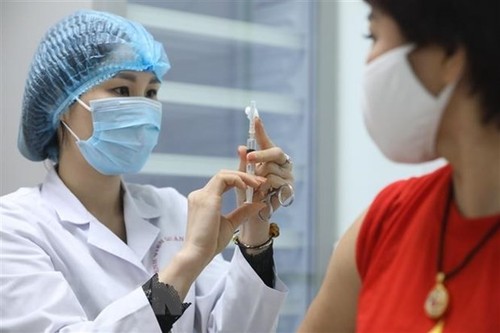 (Photo: Ministry of Health) (Photo: Ministry of Health) |
B: As of Wednesday morning (April 7), nearly 54,000 frontline workers nationwide were vaccinated and Vietnam’s tally of COVID-19 cases was at 2,648, according to the Ministry of Health. Of the total infections, more than 1,600 were domestically-transmitted cases, including 910 recorded since the latest outbreak hit the northern province of Hai Duong on January 27.
A: The Treatment Sub-committee under the National Steering Committee for COVID-19 Prevention and Control reported that Vietnam has seen more than 2,400 recoveries so far.
B: As COVID-19 cases have been on the decline around the world and vaccination programs have been rolled out in many countries, the introduction of “vaccine passports” will allow resumption of international flights.
A: These passports are expected to become used globally and boost countries’ confidence in easing movement restrictions, reviving their aviation sector, and bolstering trade and economic development while ensuring safety amid the pandemic.
B: In Vietnam, the Prime Minister has asked relevant agencies to study the use of “vaccine passports” and gradually reopen international flights.
A: The Government has made preparations for the resumption of international flights and the arrival of foreign tourists holding vaccination certificates, especially from countries with large numbers of visitors, those with potential, and those that have brought the pandemic under control, like in Europe, Australia, China, South Korea, and Japan.
B: This week, Siddhartha Bhattacharjee of India sent us reception reports for our programs on the frequency of 7220 khz and asked about Vietnamese films competing for an Oscar.
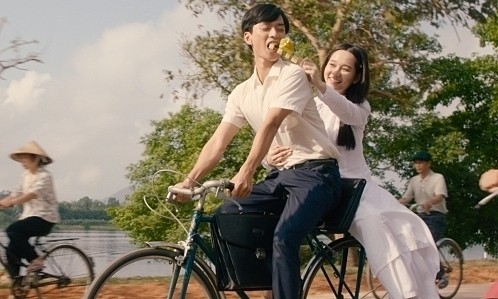 A scene from "Dreamy Eyes" A scene from "Dreamy Eyes" |
A: Romantic drama "Mat Biec" (Dreamy Eyes) will compete in the qualifying round of the foreign language film category at the 2021 Academy Awards.
B: Based on popular writer Nguyen Nhat Anh’s novel of the same name, "Dreamy Eyes" depicts the love story of Ngan, a rural boy, and his childhood friend during their school years. Even though the girl falls for a rich man and leaves Ngan, he remains by her side.
A: The film, which premiered in December last year, raked in more than 2 million USD within three days.
B: It led the box office for 18 consecutive days, matching the record of blockbuster "Avengers: End Game" when it was shown in Vietnam.
A: In recent years, domestic films have become more popular beyond Vietnam. Most recently, the Vietnamese horror film “Bong De” (The Ancestral), has been bought for screening in the Middle East, Chinese Taiwan, Thailand, Cambodia, Laos, Singapore, and Malaysia.
B: Giant agency Endeavor Content has been in touch with the film’s producers to buy the rights for showing in Indonesia, the Philippines, Myanmar, Australia, and New Zealand. It is set to release in Vietnam on May 14.
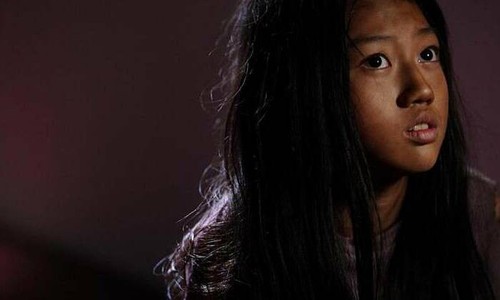 A still cut from "Bong De" (Photo courtesy of the movie) A still cut from "Bong De" (Photo courtesy of the movie) |
A: Directed by Le Van Kiet, the film is about a father and two daughters living in a centuries-old ancestral house after suffering from a family tragedy. Later many family secrets start to emerge and change their lives.
B: Kiet, 42, is a Vietnamese-American who graduated from the University of California Los Angeles (UCLA) School of Film and Television.
A: His 2019 film "Hai Phuong" (Furie) was one of the highest grossing ever in Vietnam, earning more than 8.6 million USD at the box office. It was Vietnam’s official entry at the 2020 Oscars.
B: Another film, Chi Chi Em Em' (Sister Sister) directed by Kathy Uyen won the ABC TV Award at the 2021 Osaka Asian Film Festival in Japan.
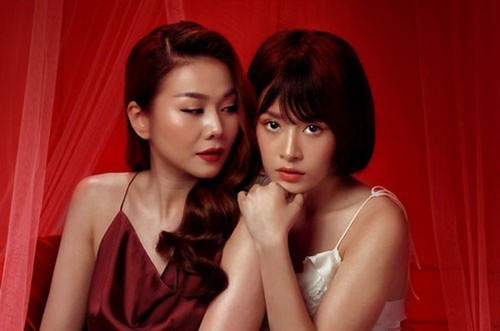 Supermodel Thanh Hang and young singer Chi Pu star in Chi Chi Em Em Supermodel Thanh Hang and young singer Chi Pu star in Chi Chi Em Em |
A: The ABC TV Awards are given by Asahi Television Broadcasting Corporation to the most entertaining film at the annual festival. 'Chi Chi Em Em' will be shown on Japanese television later this month.
B: The film had earlier been chosen for the A Window on Asian Cinema section at the Busan International Film Festival last October, and won a lot of appreciation.
A: 'Chi Chi Em Em' is about a rich talk show host who offers a room in her opulent home to a young woman whom she knows through her show despite opposition from her husband. It later forces her to face her darkest secrets and her husband's sin.
B: The movie, released in December 2019, collected more than 3 million USD.
A: This week, Ivan Lebedev of Russia wrote: “Dear Vietnamese friends ! I really like the elements of the traditional Vietnamese costume and especially the hats - conical hats, that ward off the sun. Please tell us the story of this unique head piece. I think, that Vietnamese conical hats should become a material cultural heritage of the world for their unique originality.”
B: Non la or palm-leaf conical hats are a traditional symbol of Vietnamese people. The image of the conical hat was engraved on bronze drums and jars between 2500-3000 BC.
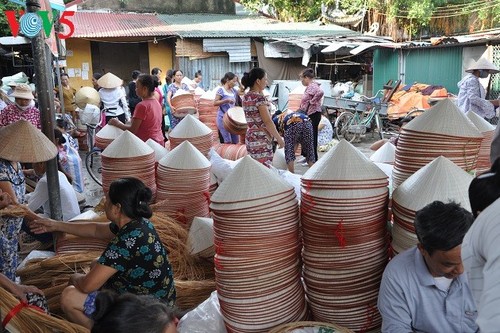 Conical hat market in Chuong village in Hanoi Conical hat market in Chuong village in Hanoi |
A: From time immemorial, the conical hat has appeared in Vietnamese daily life, folktales, literature, and the arts. Traditional conical hat making villages nationwide are tourist attractions nowadays.
B: The conical hat is usually woven with different kinds of leaves such as palm, bamboo, or coconut leaf. The hat usually has the shape of a cone as evidenced by the name. Thin and small bamboo sticks are bent into a circle with different diameters. These circles are pinned on a conical frame by thread, silk, or filament. Craftsmen make the leaves flat, cut cross-head on the top of the leaves, and uses a needle to sew the top of 24 or 25 leaves together.
A: Next, the sewed leaves are attached to the conical frame. Because the leaves are thin, the conical hat will easily deteriorate when it is worn under heavy rains. Therefore, craftsmen make use of bamboo spathes to create the second layer, so the conical hat is both hard and durable. Then, the last leaf layer is attached to the frame and this layer is the same as the first layer. All the layers are fastened with strings to the frame. The leaves on the third layer cannot cover the whole frame, so the hat maker cuts other leaves into small pieces to fill these gaps. Then, all the leaves and layers are sewed by thread around every bamboo circle on the frame.
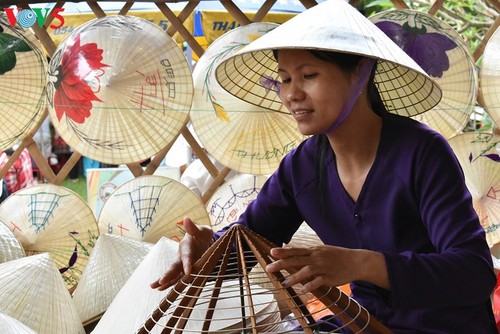 Demonstration of making conical hats at 2018 Hue Festival. (Photo: Lan Anh/VOV5) Demonstration of making conical hats at 2018 Hue Festival. (Photo: Lan Anh/VOV5) |
B: In the middle of the third and fourth bamboo circle, thread is used to tie the strap. The strap is usually made of velvet or silk in many different colors. The outside of the conical hat is covered with varnish to increase the durability and beauty.
A: Because the conical hat is so important to our culture, it is also considered a special gift purchased by tourists when visiting Vietnam.
B: We’d like to thank you all for listening to our broadcasts and sending feedback to us. We always welcome your feedback at: English Service, VOVworld, the Voice of Vietnam, 45 Ba Trieu street, Hanoi, Vietnam. Or you can email us at: englishsection@vov.vn. You’re invited to visit us online at vovworld.vn, where you can hear both live and recorded programs.
A: Check out our VOV Media App, available on both the IOS and Android platform, to hear our live broadcasts. We look forward to your feedback on the mobile version of vovworld.vn. Once again, thank you all for listening. Goodbye until next time.